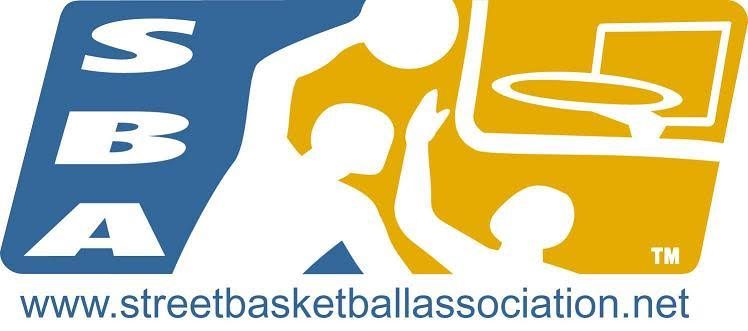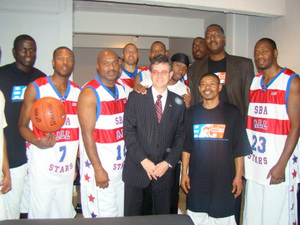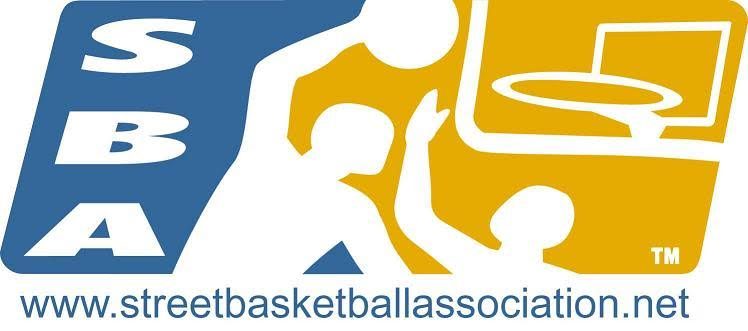07/27/2010 11:05 PM
Well, it’s been done. Thank Whiteville, N.C., native and Street Basketball Association founder and CEO Jerrod Mufstaf. Most people are familiar with the Harlem Globetrotters and more contemporary groups such as And 1, but the SBA has become the world leader when it comes to the game people today are playing on blacktops all over the globe. Street basketball is very alive today and is growing. And one of the most influential figures in the industry today was born a little over an hour away from Myrtle Beach. Meet Mustaf, former NBA player turned grassroots of basketball mogul. Mustaf’s dreams of a streetball organization with roots reaching all over the world have become a reality and the SBA puts the biggest names in the industry on display to fans all over the globe. Mustaf agreed to do a Q&A via e-mail to talk about his organization, which was founded in 2001. A little background on Mustaf first: Mustaf played at prep powerhouse Dematha in high school – and even played in Myrtle Beach-based Beach Ball Classic – before playing collegiately at Maryland. Mustaf was a first-round NBA draft pick by the New York Knicks and played in the league from 1990-1994 – with the Knicks and Phoenix Suns – before heading overseas and playing professionally for several years in Europe before retiring in 2001. That same year, Mustaf began working on the concept for the Street Basketball Association. Over the years, the organization has grown across the United States and now has branches in five continents. QA&: Street Basketball Association CEO Jerrod Mustaf Q | I know your roots in basketball are very deep. Tell me about when and how you came up with the idea for the SBA and what you envisioned from the start. Jerrod | I had dreamed of being an NBA owner or general manager once my playing days were over. With the shortage of minorities in management positions in the NBA, I wanted to be able to deliver a product that would be the envy of every sports franchise and it would be headed by a minority. I spent some time as an intern with the NBA and began plotting my course and learning the business of basketball in 1992-1993. With very few resources and no opportunities to develop my dream with the NBA or NCAA, I put my attention to “grassroots basketball.” I studied the Harlem Globetrotters, Harlem Rens and the roots of the game. I saw that there was an ownership and control vacuum with street basketball and semi-pro basketball. While finishing my last stint as a pro player in Turkey, I decided to develop the SBA concept while on the plane ride home. My good friend Litterial Green and I were flying back to the States since our team had folded and I had put my Jordans up, I decided to concentrate on the SBA. Q | I’m sure, as is the case most upcoming enterprises, there were hardships along the way. Tell me about some of the hardships you faced and how you were able to overcome them to make the SBA a reality. Jerrod | The first year, my charter team, the DC Legends, challenged each team in America to a game. Since I had promoted the SBA as a professional streetball team, I had to pay each player/coach according to our agreement. Sometimes we would play in front of 50 fans, but I would tell the team at halftime to win by a minimum of 30 points while entertaining the audience. That way, my personal losses would only extend to my bank account, but soon word would leak about this incredible streetball team from DC. The following year, my team was invited to play in Holland against professional teams where we beat a USBL All-Star team coached by my former Knicks teammate John Starks. Q | Explain, if you will, in general, how the SBA works. One thing I was wondering about was the league itself. Can you explain how it is set up and what role it plays for the SBA? Also, I know you have specialty teams, such as the USA Legends of Basketball. What role do these teams play? Jerrod |The vision was to develop and operate the first-ever professional streetball league. We did license a few teams and played a short schedule of games in 2003 and 2004, but decided that the timing was not here yet for the official launching of the SBA League across the country. Other SBA properties, such as global basketball development began to become a priority at the same time And 1 was a streetball entity that was very popular with their tours and ESPN series. The league itself is designed after the NBA model where an SBA team can be operated in every urban market in the United States. We expect to have 30 teams operating in six divisions. But, unlike the NBA, we can also set up SBA-Japan, SBA-Brazil, SBA-Nigeria, etc. Therefore, we place a lot of energy in developing the SBA brand and basketball globally. We have three official teams: the SBA All-Stars – the top 10-15 streetball players in the US;the SBA-USA Legends – a team of SBA All-Stars along with 5-6 former NBA champions/All-Stars; and the SBA Pros – SBA Sports management players who are looking to play professionally/overseas. Q | Talk a little bit about the SBA International. Explain what the expansion has done for streetball and, by way of collectivism, done for those continents in which are involved. Jerrod | Basically, we are building the SBA brand globally and are organizing other individuals and organizations/companies to promote streetball within an established protocol. We wanted to take the lead in protecting American streetball and give streetball players the opportunity to expand their career span with cross-cultural exchange through basketball development. The SBA Federation will allow us to establish rules of engagement, contract procurement and eventually an official Street Basketball World Cup. Q | Talk a little about the opportunities the SBA provides in the basketball world. From what I’ve read, it helps give a platform for players looking to play professionally – all over the world – and other players looking to display their streetball prowess in an entertainment-based manner. In addition, it appears the SBA provides jobs for former professional players to still be involved in the game after retiring from pro ball. Jerrod | The opportunities are unlimited within the SBA. Currently we have five interns learning about the sports management and marketing industry. Additionally, we develop post-career opportunities for players to remain directly involved in the game. We create paid engagements for players who have a lot to offer to the sport. The most underrated aspect of this is the opportunity for former players to learn the business of basketball. Most players always hired someone to handle all of their financial and business interests while they were playing … and for a good reason. The SBA can function as an apprenticeship for former players who want to work with an NBA or international professional basketball club. I believe that I’m grooming some of the next best sports agents now. Q | Tell me what made street ball so dear to you. I know a lot of us grow up playing it and love it. Talk about what makes it such an important part in your life and how that passion has helped you create such a unique organization. Jerrod | I love streetball because I loved the Negro Baseball League concept. We gave that up and the role of Black-owned community businesses for what has become a few roster spots in MLB and no diversity in ownership nor management. Black Americans very seldom hold themselves accountable for their own shortcomings in business and opportunities for control. They question the fact the there is only one majority black owner in the four major American pro sports. Street basketball itself is a global entity that has its roots in Black America. We have an opportunity to make history with the sport of basketball through ownership, and streetball is giving us that opportunity. The business of basketball is my passion. Q | Tell me about your connections to the Carolinas. Do you come back to the Carolinas often? Do you have any family, friends who live in the Carolinas? And if there are any specific ties you have to the Myrtle Beach area, I’d love to hear those as well. Jerrod | My family lives in Whiteville and I am there at least twice a year. We produced my first SBA game in Whiteville and my cousin Chris Wilcox played on the opposing team. That was a great game. Chris dominated, but his team came up short at the end. I represented the Haley twins – [Sammie and Simeon] – from Myrtle Beach and they played against my team … and lost before I agreed to represent them. I set a few Beach Ball Classic records in my day at Socastee High School when I played with DeMatha. Trelonnie Owens is responsible for the Southeast market for the SBA and is working on some SBA events for the fall. You may want to suggest something at the beach! Check out the SBA’s website: Street Basketball Association to read up on the organization, see team rosters and watch video of the players in action. Interview by David Wetzel, OFF THE GLASS |


